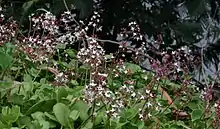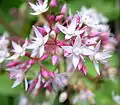| Fairy crassula | |
|---|---|
 | |
| Crassula multicava leaves and flowers | |
| Scientific classification | |
| Kingdom: | Plantae |
| Clade: | Tracheophytes |
| Clade: | Angiosperms |
| Clade: | Eudicots |
| Order: | Saxifragales |
| Family: | Crassulaceae |
| Genus: | Crassula |
| Species: | C. multicava |
| Binomial name | |
| Crassula multicava Lemaire. | |
| Synonyms[1] | |
|
Crassula quadrifida | |
Crassula multicava is a perennial succulent plant from the family Crassulaceae. It is also known under various common names including the fairy crassula, pitted crassula and London pride.[2]
Description
It is a moderate to fast growing, mat-forming plant that features buxom, oval to round and deep green, opposite leaves, with one cultivar ('Purple Dragon') having purple undersides. The plant blooms in winter in its native habitat with white to pinkish starry flowers with four petals and four sepals. It reaches an average height of 15 cm, but would reach 30 cm.[3]
Cultivation
Used as a groundcover, the plant is resistant to droughts and low temperatures above −3 °C. It also resists the lack of light and is a shade lover, but that can negatively affects its color or the quality of the flowers. Self-seeding, it can also be multiplied by cuttings. They also propagate themselves by producing plantlets on the flower head that fall off and grow into independent plants. Due to its small size, it can be grown in pots in well-composted, clay soils.[4]
Distribution
The fairy crassula is a native of South Africa, particularly the mountainous regions of Natal, Eastern and Southern Cape. There, it is found in forest margins, river and stream banks, and in coastal and subtropical thickets.[5]
Gallery
 Bunch of flowers
Bunch of flowers.jpg.webp) Habitat with emerging flowers
Habitat with emerging flowers.jpg.webp) Leaves close up
Leaves close up_03_ies.jpg.webp) Growing in Barlovento, Santa Cruz de Tenerife
Growing in Barlovento, Santa Cruz de Tenerife_C.multicava-flor-3.jpg.webp) Flowers close-up
Flowers close-up Whole plant with flowers
Whole plant with flowers Blushed leaves
Blushed leaves
References
- ↑ Registry-Migration.Gbif.Org (2019). "Crassula quadrifida Bak.fil". GBIF. GBIF Secretariat. doi:10.15468/39omei. Retrieved 9 October 2016.
- ↑ Hutchings, A., Scott, A.H., Lewis, G. & Cunningham, A.B. 1996. Zulu medicinal plants: an inventory. University of Natal Press, Pietermaritzburg.
- ↑ Crassula multicava iGarden, Home of the Compulsive Gardener
- ↑ Germishuizen, G. & Meyer, N.L. (eds) 2003. Plants of southern Africa: an annotated checklist. Strelitzia 14. National Botanical Institute, Pretoria.
- ↑ Powrie, F. 1998. Grow South African Plants. A gardener's companion to indigenous plants. National Botanical Institute, Cape Town.